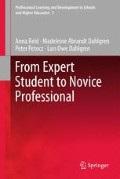Abstract
The question in the title should not be interpreted as a doubt about the usefulness of higher education but rather to encourage the kinds of investigations that the book is presenting and scrutinising. The formation of professionals, the path from expert students to novice professionals , requires creative pedagogical approaches. Each profession values different skills and knowledge , has a particular approach to knowledge development and use, an associated way of behaving, and corresponding pedagogies. Our book has shown ways of understanding this process within different professional areas with the idea of assisting students and teachers to decode that profession for the purposes of their own learning . The learning of such professional attributes need not be solely located in the academy, but could be collocated with workplaces, through the approach of interprofessional learning , the involvement of professionals with pedagogy, the involvement of students in work situations, and the alignment of learning with authentic work practices. But in the centre of all this are the expert students and novice professionals. For them the focus is not on what they know, but on who they are becoming. This is essentially an individual orientation to learning, which is a contrast to the current massification of higher education , and one which educators could well use to reappraise their practice. At the end of the journey of higher education, expert students will become novice professionals , and it is their aims and aspirations that we should support.
References
Abbott, A. (1988). The system of professions. Chicago, IL: The University of Chicago Press.
Barnett, R. (2004). Learning for and unknown future. Higher Education Research and Development, 23(3), 247–260.
Barr, H. (1998). Competent to collaborate: Towards a competency-based model for interprofessional learning. Journal of Interprofessional Care, 12(2), 181–188.
Barr, H. (2002). Interprofessional education: Today, yesterday and tomorrow. London: Centre for Health Sciences and Practice.
Bowden, J., & Marton, F. (1998). The university of learning: Beyond quality and competence. London: Kogan Page.
Brookfield, S. D. (1995). Becoming a critically reflective teacher. San Francisco, CA: Jossey-Bass.
Burton, L. (2004). Mathematicians as enquirers: Learning about learning mathematics. Dordrecht: Springer.
Falchikov, N. (2005). Improving assessment through student involvement: Practical solutions for aiding learning in higher and further education. Oxford: Routledge.
Faresjö, T., Wilhelmsson, M., Pelling, S., Dahlgren, L. O., & Hammar, M. (2007). Does inter-professional education jeopardise medical skills? Journal of Interprofessional Care, 21, 573–576.
Lave, J., & Wenger, E. (1991). Situated learning: Legitimate peripheral participation. Cambridge: Cambridge University Press.
Marton, F., Hounsell, D., & Entwistle, N. J. (Eds.). (1998). The experience of learning. Edinburgh: Scottish Academic Press.
Petocz, P., & Reid, A. (2003). Relationships between students’ experience of learning statistics and teaching statistics. Statistics Education Research Journal, 2(1), 39–53.
Piaget, J. (1954). The construction of reality in the child. New York, NY: Basic Books.
Pintrich, P. (2002). The role of metacognitive knowledge in learning, teaching, and assessing. Theory into Practice, 41(4), 219–225.
Rønnestad, M., & Skovholt, T. (2004). The journey of the counselor and therapist: Research findings and perspectives on professional development. Journal of Career Development, 30(1), 5–44.
Schön, D. (1983). The reflective practitioner: How professionals think in action. New York, NY: Basic Books.
Schön, D. (1987). Educating the reflective practitioner. San Francisco, CA: Jossey-Bass.
Scott, G., & Yates, K. W. (2002). Using successful graduates to improve the quality of undergraduate engineering programs. European Journal of Engineering Education, 27(4), 363–378.
Sjöström, B., Dahlgren, L. O., & Haljamäe, H. (2000). Strategies used in postoperative pain assessment and their clinical accuracy. Journal of Clinical Nursing, 9, 111–118.
Sjöström, B., Haljamäe, H., Dahlgren, L. O., & Lindström, B. (1997). Assessment of postoperative pain: Impact of clinical experience and professional role. Acta Anaesthesiologica Scandinavica, 41, 339–344.
Wenger, E. (1998). Communities of practice: Learning, meaning and identity. Cambridge: Cambridge University Press.
AUSSE (2008). The Australasian survey of student engagement report. Australian Council for Education Research, Sydney. Retrieved from http://www.acer.edu.au/documents/AUSSE_2008-StudentEngagementReport.pdf.
Scott, G. (2006). Accessing the student voice: Using CEQuery to identify what retains students and promotes engagement in productive learning in Australian higher education. Retrieved from http://www.dest.gov.au/sectors/higher_education/publications_resources/profiles/access_student_voice.htm.
Centre for the Advancement of Interprofessional Education CAIPE (1997). Interprofessional education – a definition. CAIPE Bulletin, 13, 19. Retrieved from http://commonlearning.ncl.ac.uk/clp/tclp01_ipl.
Eraut, M. (2007). Learning from other people in the workplace. Oxford Review of Education, 33(4), 403–422.
Author information
Authors and Affiliations
Corresponding author
Rights and permissions
Copyright information
© 2011 Springer Science+Business Media B.V.
About this chapter
Cite this chapter
Reid, A., Dahlgren, M.A., Petocz, P., Dahlgren, L.O. (2011). What’s the Use of Higher Education?. In: From Expert Student to Novice Professional. Professional Learning and Development in Schools and Higher Education, vol 99. Springer, Dordrecht. https://doi.org/10.1007/978-94-007-0250-9_8
Download citation
DOI: https://doi.org/10.1007/978-94-007-0250-9_8
Published:
Publisher Name: Springer, Dordrecht
Print ISBN: 978-94-007-0249-3
Online ISBN: 978-94-007-0250-9
eBook Packages: Humanities, Social Sciences and LawEducation (R0)

